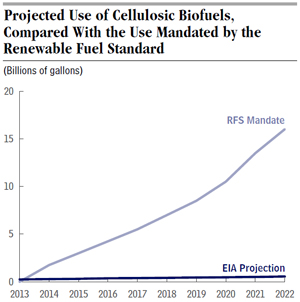Congressional Budget Office Undermines Key Assumption of Governor's Low-Carbon Fuel Standard
Famed physicist Neils Bohr once noted, "Prediction is very difficult, especially about the future." If you compound that difficulty by betting major public policy on your ability to predict correctly, the result is likely to be a costly failure.
Take, for example, Governor Inslee's predictions about low-carbon fuel, which he now wants to make the basis of his policy to reduce carbon emissions. At issue is the emergence of a new, purportedly less-costly and more efficient, type of biofuel called "cellulosic" ethanol.
In his book, Governor Inslee was explicit about the need for cellulosic ethanol to improve environmental outcomes and reduce price. He wrote:
It would be comforting to avoid the prospect of being proven wrong by the passage of time. But your authors are built of sterner stock. We refuse to take refuge in the privilege of punditry to cloak our comments in vague surmises. ... About 2011 meaningful amounts of cellulosic ethanol are becoming available at service stations across the country. … cellulosic ethanol will make a rapid penetration of the market.
This prediction has already proven to be incorrect. There was virtually no cellulosic ethanol available in 2011. Last year, two years after Inslee's deadline, the EPA was forced to reduce its target for cellulosic biofuel production from 6 million gallons down to 810,185 gallons because it was all that was available. To put that in context, in 2013, the United States consumed 134.51 billion gallons of gasoline according to the Energy Information Administration. Cellulosic biofuel accounted for less than 0.001 percent of total fuel consumed in the United States – about 189 seconds worth of fuel last year.
Despite that failed prediction, the Governor is likely to double down on his prediction, betting that cellulosic ethanol is, one again, just around the corner.
Although the Governor has repeatedly told people to "calm down" because he has no plan for a low-carbon fuel standard (LCFS), there are only a limited number of ways to design an LCFS. That is why, even though the Governor has not identified a specific LCFS plan, his climate workgroup was able to complete an analysis of what an LCFS might cost.
We critiqued that analysis in March because the rosy cost scenarios "rely on the emergence of cellulosic ethanol, which is much lower cost than current biofuels." A new report by the Congressional Budget Office shows how unlikely that is.
 In a new report, "The Renewable Fuel Standard: Issues for 2014 and Beyond," the Congressional Budget Office (CBO) included this graph. It shows the government mandate for cellulosic ethanol rising to 16 billion gallons by 2022 but supply increasing to only 327 million gallons, or two percent of the mandate.
In a new report, "The Renewable Fuel Standard: Issues for 2014 and Beyond," the Congressional Budget Office (CBO) included this graph. It shows the government mandate for cellulosic ethanol rising to 16 billion gallons by 2022 but supply increasing to only 327 million gallons, or two percent of the mandate.
Demand for gasoline has leveled off during the last decade, so total consumption in 2022 could be similar to the 134 billion gallons of last year. Even if that is the case, the total projected amount of cellulosic ethanol would represent 0.24 percent of total fuel used, less than one day of fuel for the country.
A low-carbon fuel standard would require much more cellulosic ethanol than the Energy Information Administration estimates will be available. The analysis of the LCFS for the Governor's climate task force last year assumed the state would double the percentage of biofuel in a gallon of gas. Even assuming all of that 327 million gallons of cellulosic ethanol went to Washington state, it would account for only 13 percent of Washington’s total fuel and would require other types of ethanol to make up the gap – ethanol that is more costly and polluting.
The response to this stark reality has generally been something like "we invented software and the four dollar cup of coffee" and we can solve this. Of course, it wasn't politicians who invented those. You didn't build that. Hope is not a strategy.
Given the history of failed predictions on these issues, we shouldn't risk Washington’s climate strategy on more false hope.

